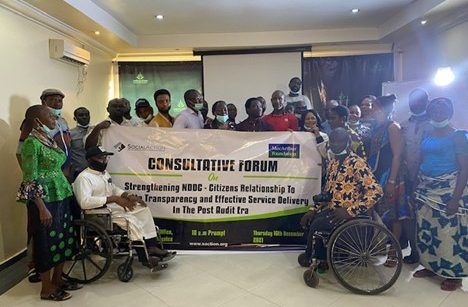
The part of citizens in demanding accountability and transparency in a commission that was solely established to foster development in the Niger Delta region cannot be overemphasized. The NDDC functionality must reflect the interest of citizens. For this to happen, there must be a cordial relationship between the citizens and the commission. To foster this relationship and encourage citizen interest in the NDDC, Social Action with the support of the MacArthur foundation organized a Consultative forum on “Strengthening NDDC- Citizens Relationship To Promote Transparency and Effective Service Delivery In The Post Audit Era.”

In his welcome address, the Senior Programs Officer of Social Action, Prince Ekpere spoke on the shortcomings of the Commission since its inception and how it has operated without any form of scrutiny or checks and balances. For him, there is no better time to have this conversation and demand transparency on the financial affairs of the commission and the accessibility of these fiscal documents to the public. He also tasked the antigraft agencies to be up and doing to ensure all those who have misused funds from the Commission be made to face the wrath of the law.
In his presentation on “NDDC and Citizens Relationship: Challenges and Opportunity for Collaboration Engagement for Inclusive and Effective Service Delivery” The Executive Director of We the People, Ken Henshaw remarked that NDDC money is being stolen daily by a group of persons. The people no longer know what the role of the NDDC is as it has failed to respond to the issues of development in the Niger Delta region. The Commission, which he termed ‘a crime scene’, is now a settlement ground. He emphasised the need for us as citizens to criminalize corruption by recognizing it as a crime and demanding the release of the forensic audit report.

A panel session that focused on “Towards An Inclusive Citizens/Community-led Development Approach Panacea for Curbing Corruption in the NDDC had Comrade Maxwell Ati and Comrade Princess Egbe as co-panelists. Others were Dr. Tare Dadiowei, Evangelist Duke Fekeregha and was moderated by Ken Henshaw. Dr Tare Dadiowei urged the Niger Delta people to fight for their rights as the responsibility of drawing their own map lies within them. He cautioned that the people cannot continue to live as if nothing is at stake and expect that things will change. We must demand the change we desire, he said. While Comrade Maxwell Ati blamed the communities for refusing to put an end to an abnormality that has become a norm, he noted that it is time to make a move towards the demand for accountability and transparency from public duty bearers. Comrade Princess Egbe in her remarks pointed to the fact that the people must swing into action, campaign with one voice and demand change as the only way forward. While Evangelist Duke Fekeregha spoke on changing our mentality of a short-term personal gratification to a long term communal benefit as a way to engender endearing values and conditions that foster development in our communities.
The attendees who spoke during the interactive session also suggested ways the campaign and demands for accountability and transparency for effective service delivery in the post-audit era can be achieved. One of such ways include to:
- Take the message to the grassroots and sensitize them on the need to buy into the ownership philosophy as the NDDC ‘money of the money’ of the people and they should be concerned about what happens there.
- Work as a group, strategize and work towards implementing recommendations made in the forum and intensify all that has been said and keep the conversation ongoing
- Hold our community leadership accountable, use the structure of leadership to drive home the point and make leaders more responsible and responsive to the needs and aspirations of the Niger Delta region.
- Demand for environmental Impact assessment to be carried out before projects are implemented.
